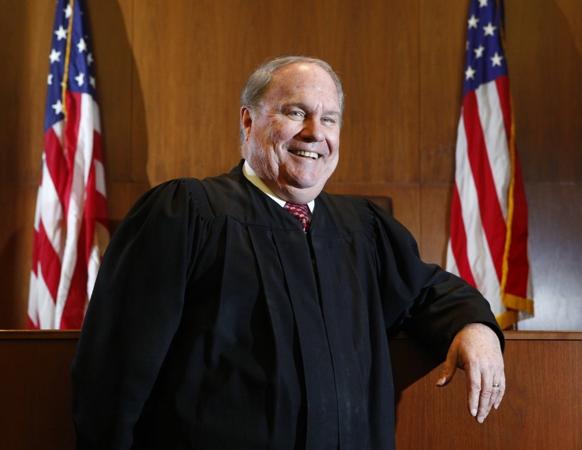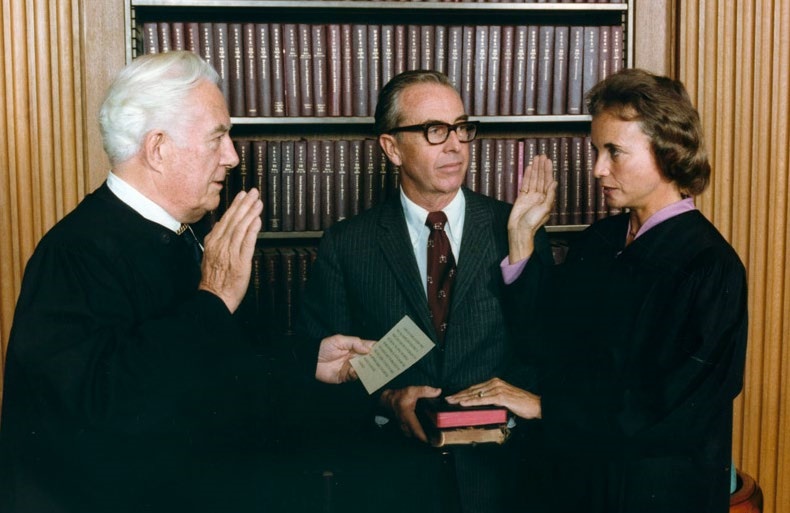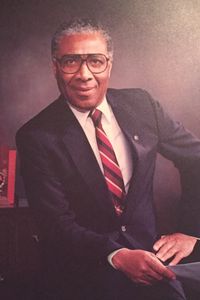
In the Winter 2023 edition of the Stereoscope, colleagues and family remember the life and legacy of the Honorable Robert Holmes Bell, who passed away at age 79 on June 8, 2023.
Court historian, Hugh W. Brenneman, Jr., introduces a portrait of Judge Bell and tributes from his colleagues and family highlight his life and career.
Volume 18, Issue 3 of the Stereoscope recalls Justice Sandra Day O’Connor’s visit to Mackinac Island some 38 years ago, to attend the Sixth Circuit Judicial Conference. Court historian, Hugh Brenneman, Jr., paints a portrait of who she was in those early years, on and off the Court,and tells interesting and amusing stories of her time on the island and what the Conference may have foreshadowed.
In the Spring 2021 edition of the Stereoscope , Court Historian Hugh W. Brenneman, Jr. remembers the life and legacy of the Honorable Benjamin F. Gibson, who passed away at age 89 on January 13, 2021.
Memorialized as "The Gentleman Judge,” Judge Gibson served as District Judge in the Western District of Michigan during the 1980s and most of the 1990s.
He is as remembered for the exemplary manner in which he carried out his judicial duties as he is for the numerous racial barriers he overcame along the way.
"Our First District Judge and the Civil War", by David J. Gass. President Lincoln nominated the Western District's first district judge on March 12, 1863. Solomon Withey was a 42-year-old Grand Rapids lawyer. His appointment occurred at the mid-point of the Civil War and at the low point of the union's prospects for victory. While he served for 23 years as the only judge for the Western District, his first two years coincided with the last two years of the Civil War. This article focuses on those first years of Judge Withey's tenure and its close association with the monumental events occurring during the "War of Rebellion." The second session of the Court occurred on July 1 and 2, 1863, in the new federal courtroom - a three-story building located the northwest corner of Pearl and Monroe (then Canal), where the Amway Grand Plaza now stands. Ironically, that opening of the new courtroom coincided with the Battle of Gettysburg, which was fiercely raging some 500 miles to the southeast. Most of Judge Withey's cases were related in some way to the Civil War, and some of his comments on the Civil War made in court were recorded by the local newspapers. This included his remarks on President Lincoln's assisination. Judge Withey's portrait today hangs high on the back wall of Judge Bell's courtroom. Next year marks the 150th anniversary of his appointment.
"The Taxing Journey of the Daniel Ball," by Michael Puerner. The Daniel Ball was the queen of steamboat traffic on the Grand River. Its owners had declined to pay a federal licensing fee on the grounds that they conducted business only in the state of Michigan, indeed only on the Grand River, and hence were not subject to laws enacted under the interstate and foreign commerce clause of the United States Constitution. Judge Soloman Withey, the first judge of our Western District Court, and an appointee of President Abraham Lincoln, agreed and dismissed the Government's case against the Daniel Ball. The Sixth Circuit Court of Appeals, however, reversed, on the grounds that the Grand River flows into Lake Michigan, which facilitates transportation and interstate commerce between several great lakes states. The United States Supreme Court agreed with the Sixth Circuit, Mr. Justice Stephen Field, delivering the unanimous opinion of the Court. The Supreme Court's decision in the Daniel Ball case remains one of the most frequently relied upon precedence in commerce clause cases.
"A Flakey Patent Case," between the Sanitas Nut Food Company and the Voigt Milling Company of Grand Rapids. The Sanitas Nut Food Company was founded by Dr. John Harvey Kellogg and his younger brother Will K. Kellogg, to promote the commercial sales of the "Granose Flakes" which Dr. Kellogg gave to patients visiting the Kellogg Sanitarium. Dr. Kellogg refused to put the Kellogg name on a commercial product, because he didn't want to taint the reputation of his sanitarium with commercialization. The third United States District Judge for the Western District of Michigan, Judge Wanty, found Dr. Kellogg's patent to be invalid, because it had been derived by him during a visit to the processing plant of one Henry D. Perkey of Denver, Colorado, who had developed a "shredded biscuit." The utcome of the case may have contributed to the split between Dr. Kellogg and his younger brother Will, which resulted in Will's founding of the W. K. Kellogg Company.
"Major League Baseball in Grand Rapids." In the spring of 1914, the top legal talent in the nation gathered in Grand Rapidsto litigate over the "reserve clause" of Reindeer Bill Kiliker's 1913 contract with the Philadelphia Phillies. He had violated the clause by joining the Chicago Whales. He then repudiated the Whales contract by returning to the Philadelphia Phillies. The Chicago Whales and the federal baseball league sued seeking to enjoin Reindeer Bill from playing baseball for any team other than the Chicago Whales. The Phillies relied on the reserve clause which Reindeer Bill had violated, as a basis for justifying his return to the Phillies and repudiation of his agreement with the Whales.
Judge Sessions, the fourth United States District Judge for the Western District of Michigan found the reserve clause to be unenforceable, but nevertheless ruled against the Chicago Whales for having interfered with Reindeer Bill's "moral, if not legal, duty to furnish his services to the Phillies for the season of 1914. . .."
"The Grand Rapids Attorney Who Cross Examined General Billy Mitchell." Then there was Grand Rapids patent attorney Frank Liverance, who in the early 1930s had the opportunity to cross-examine the famous General Billy Mitchell in a patent case which pitted Grand Rapids inventor Willis Perkins against Raymond Sperry, the "Howard Hughes" like son of the founder of Sperry Instrument Company. The case involved a system for launching and recovering airplanes from dirigibles, two of which had been commissioned by the United States Navy employing the patented system. Both Sperry and Perkins claimed to have invented the system, but Sperry was posthumously awarded the patent. Unfortunately for the success of the invention, the frequent crashes of dirigibles, including the two Navy dirigibles which employed the patented system, resulted in a relatively short commercial life span for anything related to dirigibles.
Click here to see a video of a "dirigible as aircraft carrier" in action.
 Etiam non lacus ac velit lobortis rutrum sed id turpis. Ut dictum, eros eu blandit pellentesque, nisi nisl dapibus mauris, sed feugiat enim urna sit amet nibh.
Etiam non lacus ac velit lobortis rutrum sed id turpis. Ut dictum, eros eu blandit pellentesque, nisi nisl dapibus mauris, sed feugiat enim urna sit amet nibh. 






